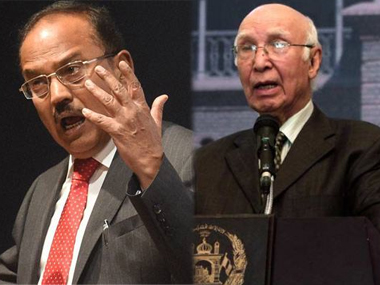“Our High Commissioner in India has been informed by the Ministry of External Affairs that the Government of India — taking exception to the High Commissioner’s meetings with Kashmiri leaders — has decided to call off the foreign secretary level talks scheduled for August 25, 2014 in Islamabad,” said the Pakistan
Ministry of Foreign Affairs (MoFA) in a statement issued on 18 August, 2014. The growing sense of déjà vu is inescapable. At the risk of jinxing an improvement in India-Pakistan relations, the process of trying to schedule diplomatic dialogue — this time, between National Security Advisers Ajit Doval and Sartaj Aziz — is becoming all too formulaic. [caption id=“attachment_2391764” align=“alignleft” width=“380”] Ajit Doval and Sartaj Aziz. PTI[/caption] The latest ‘provocation’ to India, as last year when foreign secretary-level talks were cancelled by New Delhi, is a meeting with Kashmiri separatist leaders. A
PTI report quotes Ayaz Akbar, spokesperson for the Syed Ali Shah Geelani-led faction of the Hurriyat Conference confirming that the group had been “invited for the talks with Pakistan NSA Sartaj Aziz”. Stating that a decision on whether Geelani would attend, will be taken at a meeting of the Hurriyat, Akbar welcomed the position taken by Pakistan “that there will be no dialogue with India without inclusion of Kashmir issue”. Meanwhile, the faction headed by Mirwaiz Umar Farooq has also been invited and although a meeting on Wednesday will be held to decide on their attendance, PTI quotes sources in the Mirwaiz-led group who said that the meeting will be a mere formality because they “believe in dialogue as a solution for the Kashmir issue”. In August 2014, when a similar situation had arisen, the then spokesperson for India’s Ministry of External Affairs,
Syed Akbaruddin had said , “This is a red line we have drawn… We have told Pakistan — you either talk to us, or to them (Kashmiri separatists)”. More than a red line, Islamabad seems to have interpreted the issue as a red button to be pressed whenever the need to “
irritate India” arises. This, however, appears to go well beyond mere irritation. What we are witnessing is the Pakistani military and its civilian government actually working in sync to do their best and derail the talks. Why? Whether stalling for time on the 26 November 2008 Mumbai attacks inquiry, or avoiding a discussion on Dawood Ibrahim (believed to be sheltered in Pakistan) or pretending self-confessed Pakistani citizen Mohammed Naved (captured after the Udhampur attack) doesn’t exist, neither of the Sharifs — Prime Minister Nawaz Sharif and Chief of Army Staff Raheel Sharif — appear to want constructive talks with India. Unfair allegations? Look at the evidence: Soon after the 10 July meeting between Prime Minister Narendra Modi and his Pakistani counterpart Sharif on the sidelines of the SCO Summit in Ufa, Russia, voices in Pakistan and the Valley decried the fact that Jammu and Kashmir was not mentioned in the
joint statement. Since then there have been “40 (ceasefire) violations” in August alone — leading UN Secretary-General
Ban-ki Moon to call on both countries to exercise maximum restraint. And there have also been terror attacks in Gurdaspur and Udhampur in July. On Tuesday, at the UN Security Council, Pakistan’s permanent representative to the UN
Maleeha Lodhi sought mediation from the UN and the Organisation for Islamic Cooperation in resolving the Kashmir issue, a matter that India has staunchly wanted to
resolve bilaterally. As for the talks with separatist leaders, Aziz had
admitted to The Hindu in September 2014 that Pakistani High Commissioner to India Abdul Basit’s talks with the Hurriyat were not “necessary” right before the meeting of foreign secretaries. “Our right to meet different representatives of the Kashmiri people is always there… but that doesn’t mean that it has to take place this particular time,” he had said. And yet, here we are again. Even as
The Hindu notes that India’s foreign policy has graduated from “no talks until terror stops” to “talk about terror”, and the Pakistan Observer taking cognisance of the potential for economic prosperity, calls on the country to “continue to engage India, no matter at what level and no matter on what subject”. The atmosphere, as
The Asian Age points out, has already become vitiated. This could see the talks, should they happen, deadlocked by rhetoric before they even have a chance to get off the ground. This perhaps would allow more time to be lavished on discussing the more ‘important’ issues, like the
resumption of India-Pakistan cricket ties. But wait, you may well ask, if Pakistan doesn’t want talks, why doesn’t Islamabad just go cancel them instead of embarking on this far more complicated and tedious route? Answer: That doesn’t fit into
the Pakistani strategy of denial, misdirection and self-victimisation. By letting New Delhi cancel talks, Islamabad is able to take the perceived moral high ground and tell the world (especially Kashmiris) that India is not interested in the peace process. For example, check out last year’s MoFA statement issued after foreign secretary-level talks were cancelled by India. It rued that the “Indian decision is a setback to the efforts by our leadership to promote good neighbourly relations with India”. Let’s hope this growing sense of déjà vu doesn’t turn into an overwhelming sense of inevitability.
Next week’s dialogue between the national security advisers of India and Pakistan is in jeopardy, after Islamabad invited Kashmiri separatists to meet with NSA Sartaj Aziz. This is not unique, and follows a pattern used by Islamabad to derail diplomatic talks
Advertisement
End of Article
Written by Karan Pradhan
Author tweets @karanpradhan_ see more


)

)
)
)
)
)
)
)
)



